Table of Contents
Imagine browsing your favorite online store, filling up your cart with everything you need, and then… something goes wrong. Maybe the checkout process is confusing, or you’re faced with unexpected import duties or shipping or return fees. Frustrating, right? That’s when you reach out to customer support, hoping for a quick fix. Now, think about how you’d feel if, after that interaction, the store reached out to ask about your experience and actually used your feedback to make things better. That’s what Customer Satisfaction Score (CSAT) is all about.
In this article, we’ll dive into the best CSAT tools available for ecommerce and retail businesses. We’ll look at what makes them stand out and how they can fit into your existing systems. Whether you’re a small online store or a large retail chain, finding the right CSAT platform can be a game-changer. Let’s get started!
Key Takeaways
- CSAT surveys focus on a customer’s immediate feelings about a specific interaction (such as, after a ticket is resolved) or experience with your brand (like, how smoothly a delivery was handled).
- Consider using specialized CSAT tools explicitly designed for Ecommerce and Retail, as they often include features tailored to the unique challenges of these industries.
- Focusing on key features like ease of integration, customizability, real-time feedback, and comprehensive analytics can help you select a CSAT tool that aligns with your specific needs and growth plans.
Understanding CSAT
CSAT is a simple metric that tells you how happy your customers are with your products, services, or overall shopping experience. Imagine asking your customers, “How satisfied are you with your recent purchase?” and getting a score that clearly shows whether they’re thrilled, indifferent, or disappointed. That’s what CSAT does – it gives you a direct line to your customers’ feelings.
Typically, these surveys ask customers to rate their satisfaction on a scale from “very dissatisfied” to “very satisfied”. In an ecommerce and retail set-up, CSAT surveys are mostly used after a customer service interaction to assess how well the business meets customer expectations in real-time.
But why is CSAT so important for Ecommerce and Retail? Happy customers are more likely to return, recommend your store to others, and spend more over time. On the flip side, dissatisfied customers might not come back, and worse, they could share their negative experiences with others. In a time where online reviews and word-of-mouth can make or break your business, keeping an eye on CSAT is key to staying ahead of the competition.
CSAT Software: More Tools, More Choices
When it comes to gathering customer feedback in ecommerce and retail, CSAT is the favored option. As a matter of fact, there are about twice as many CSAT tools than NPS available, particularly for brands. This is largely because CSAT surveys are typically embedded within customer service workflows, making them an easy and effective way to gauge customer satisfaction with specific interactions. With so many CSAT solutions at hand, businesses have a wider range of options to choose from.
Why CSAT Tools Are More Commonly Used
CSAT tools are particularly popular in Ecommerce and Retail for several reasons:
- Immediate Feedback: CSAT surveys focus on specific interactions or transactions, allowing businesses to gather immediate feedback. This helps companies quickly identify and resolve issues, leading to a more responsive customer service approach.
- Actionable Insights: The straightforward nature of CSAT surveys – often asking customers to rate their satisfaction on a scale of 1 to 5 – makes it easy for businesses to interpret the results and take actionable steps to improve customer experience.
- Broad Applicability: CSAT surveys can be used at various touchpoints in the customer journey, from post-purchase to customer support interactions. This makes them suitable for a wide range of scenarios.
- High Response Rates: Because CSAT surveys are short and focused, they tend to have high response rates. Customers are more likely to complete a quick satisfaction survey than lengthy customer feedback questionnaires.
- Ease of Integration: Many CSAT tools are designed to integrate seamlessly with existing customer support and helpdesk platforms. This integration streamlines the process of collecting and analyzing feedback.
Commonly Integrated Tools
In Ecommerce and Retail, some businesses prefer the convenience of helpdesk platforms with built-in CSAT surveys, allowing them to collect feedback immediately after support interactions. Here are some examples of the most commonly used helpdesk platforms that provide basic CSAT survey capabilities:
- Gorgias offers built-in CSAT features within its customer service platform, enabling businesses to gather feedback directly during their support workflows.
- Zendesk integrates CSAT capabilities into its broader support suite, allowing businesses to track customer satisfaction alongside other service metrics. This integration provides a practical, yet somewhat basic, way to monitor overall service performance without needing a separate CSAT tool.
- Gladly is a customer service platform designed to improve customer service experiences. It provides embedded CSAT functionality and allows businesses to collect feedback immediately after interactions.
Limitations of Integrated Tools
While integrated CSAT features within general helpdesk tools like Zendesk or Gorgias can be convenient, they often fall short in several key areas. These tools typically offer basic feedback mechanisms, which may be sufficient for surface-level insights but lack the depth required for more comprehensive analysis. The reporting and analytics capabilities are often limited, and customization options for surveys are generally restricted. This can lead to a lack of flexibility in how feedback is collected and interpreted.
Moreover, there’s a risk of bias in customer feedback when using integrated tools. Customers may hesitate to provide negative feedback to avoid upsetting the customer service agent they interacted with. This can result in skewed data that doesn’t accurately reflect customer sentiment, making it difficult to identify and address underlying issues.
The Case for Specialized Tools
Therefore, specialized CSAT tools offer several advantages over the built-in options available in general helpdesk software, including:
- Better Customization: Specialized tools allow businesses to tailor survey designs to their specific needs, offering far more flexibility than general helpdesk tools. This includes the flexibility to add more survey questions, customize those questions, personalize branding and choose different delivery methods.
- Seamless Integration: Specialized tools often provide better integration capabilities, allowing you to connect feedback data with other systems like ecommerce platforms, and marketing automation tools. This integration ensures a more rounded view of the customer journey and more cohesive data analysis.
- Enhanced Analytics: With specialized tools, businesses can access more detailed insights and reporting capabilities. This allows for deeper analysis of customer feedback, enabling businesses to identify trends, track progress over time, and make data-driven decisions.
- Improved Customer Engagement: Tools designed specifically for customer feedback tend to offer better user experiences, resulting in higher response rates and more meaningful data. These tools are often more user-friendly, both for businesses setting up surveys and for customers responding to them.
- Lack of Specialization: General helpdesk tools are designed to handle a wide range of customer service tasks. As a result, their feedback features might not be as refined or user-friendly as those found in specialized tools, which are built with customer feedback as their primary focus.
- Scalability: As your business grows, specialized tools can scale with you. They offer the flexibility to handle increasing volumes of feedback and more complex analytics requirements so you can continue to effectively manage customer satisfaction at scale.
- Reduced Bias: These tools help improve data accuracy, as customers are often reluctant to give negative scores when asked directly in the same chat where their issue was just resolved. They tend to be more honest and open when given the opportunity to provide feedback later, such as through a follow-up email or by clicking a rating button, like an emoji or 5-star system, in an email signature.
Shortly, while integrated tools offer convenience, specialized CSAT tools provide the depth and flexibility needed to truly understand and improve the customer experience.
Best CSAT Software for Ecommerce & Retail
1. Top Choice: Retently
Description: Retently is a powerful feedback management platform designed to help businesses gather, analyze, and act on customer feedback. While renowned for its NPS capabilities, Retently also excels in CSAT & CES surveys, making it a flexible tool for measuring customer satisfaction at various touchpoints. Its advanced features and real-time analytics make it a top choice for businesses that need comprehensive feedback solutions.
Features: The platform supports various metrics, including NPS, CSAT, 5-Star and CES surveys, allowing businesses to measure customer satisfaction from multiple angles. Retently’s CSAT features include multi-channel survey distribution, customizable and fully branded questionnaires, automated campaign management, real-time feedback collection, and detailed analytics that help businesses make informed decisions based on customer satisfaction data. Retently includes dynamic reporting and audience segmentation, enabling brands to analyze responses based on specific customer groups. Apart from advanced reporting, users benefit from benchmarking tools, AI-powered feedback classification, and real-time email, Slack and Teams alerts.
Retently also comes with strong QA (Quality Assurance) features that help you keep your customer interactions on point. You can easily assign responses to specific agents or team leads, add notes to responses for better context, and track progress with response statuses. This makes it simple to manage feedback and ensure the support team consistently delivers great service.
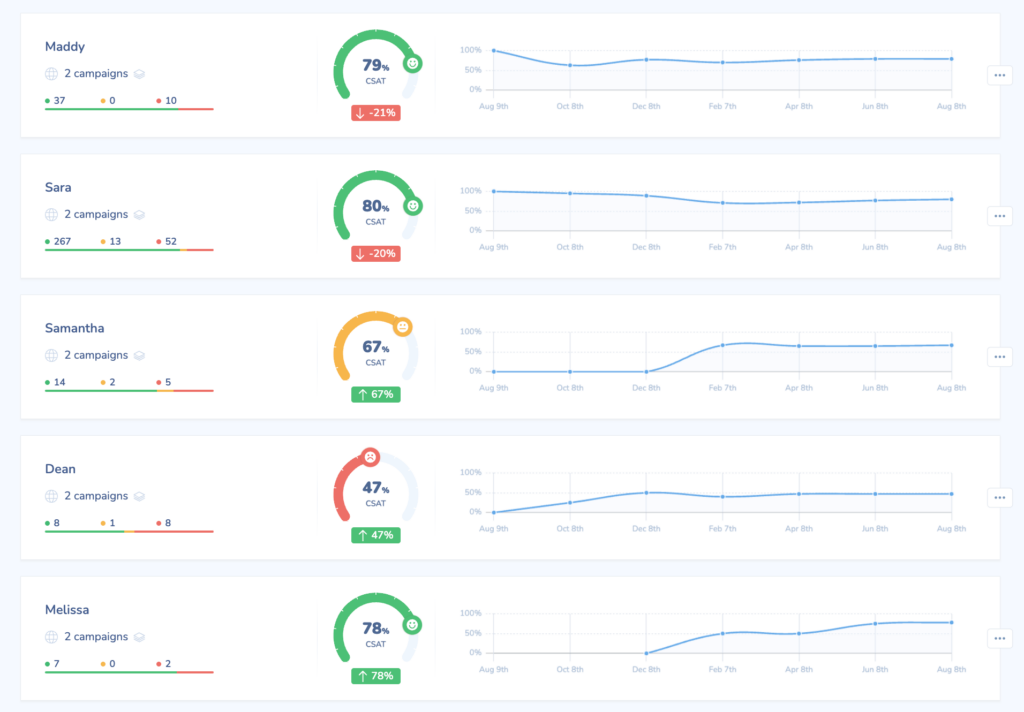
User Reviews: Retently receives high praise for its ease of use and seamless integration with tools like Intercom, making it a favorite for businesses needing a quick setup. Users appreciate the intuitive interface and the ability to launch survey campaigns without hassle. Customer support stands out as a major pro, with many users reporting prompt and helpful responses that improve their experience with the platform. Additionally, the platform’s customization options allow businesses to tailor their surveys effectively, which users find valuable. Retently is also highly rated for its comprehensive features, making it a reliable choice for businesses that want to enhance their customer feedback processes.
Pricing: Retently’s pricing is competitive, with plans that cater to businesses of different sizes and needs.
Rating Breakdown: Retently scores consistently high across key metrics, reflecting strong overall user satisfaction rated at 4.9. The platform’s Ease of Use receives an impressive average rating of 4.8 out of 5, indicating that users find it straightforward and efficient to operate. Customer Service is another standout, with a rating of 4.9, highlighting the platform’s reliable and responsive support, essential for maintaining user satisfaction. The Features score, averaging 4.8, suggests users who are pleased with the platform’s functionalities. The Value for Money rating of 4.9 underscores Retently’s appeal as a cost-effective solution, providing excellent service and features at a competitive price point.
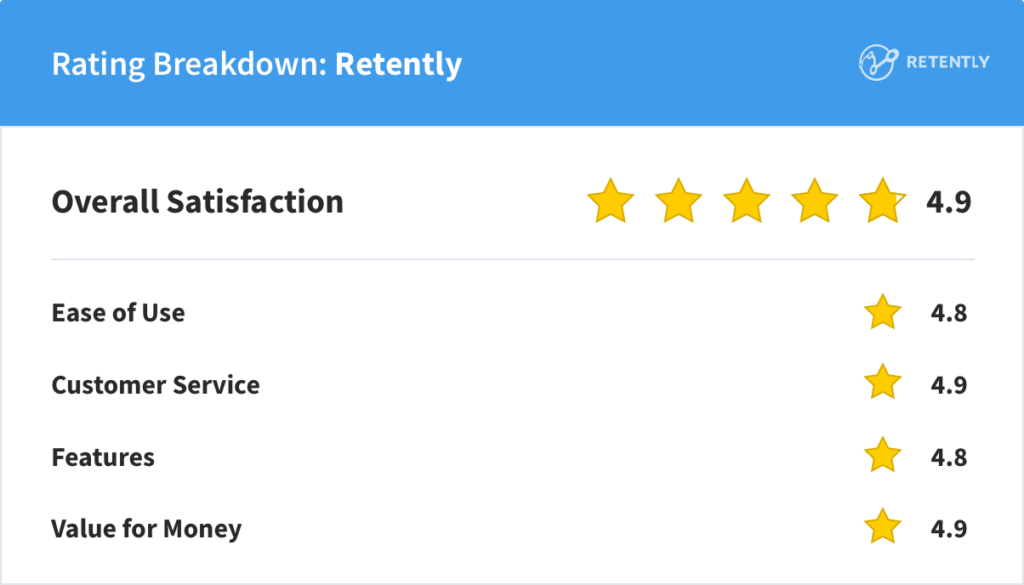
Honorable Mentions
2. Medallia Agent Connect (known in the past as Stella Connect)
Description: Medallia Agent Connect is a QA tool that also includes CSAT features, designed to improve customer service interactions via real-time feedback. It has an emphasis on humanizing customer-agent interactions and boosting agent engagement through gamification and rewards.
Features: The platform offers agent-level insights, allowing targeted coaching and performance improvements. Additionally, its gamification and rewards systems, including leaderboards, are designed to motivate and engage agents by recognizing their achievements. The tool also integrates with ticketing systems, while customizable surveys help align the feedback process with the company’s branding and specific goals.
User Reviews: On the positive side, users appreciate the platform’s intuitive interface, which makes it easy to navigate for both agents and managers. The real-time feedback system and gamification features are praised for boosting agent motivation and improving service quality. Customizable agent profiles and real-time feedback tracking are also seen as major advantages. The customer service team also performs well.
However, some users report occasional technical issues with the platform, though these are generally infrequent. The UI design could benefit from clearer distinctions, as similar colors in the menu can be confusing. Additionally, while the QA features are useful, some users feel they are less comprehensive.
Pricing: The tool’s pricing is not publicly disclosed but is generally considered higher than average, starting from 16,000 $ per year. Custom quotes are provided based on company size and needs.
Rating Breakdown: Medallia Agent Connect has received high ratings from users, with an overall rating of 4.9 out of 5. The platform is highly regarded for its ease of use (4.9 out of 5), Customer Service (4.9 out of 5), and Features (4.9 out of 5). While its Value for Money is rated lower at 4.5 out of 5, most users believe the cost is justified by the benefits the tool provides.
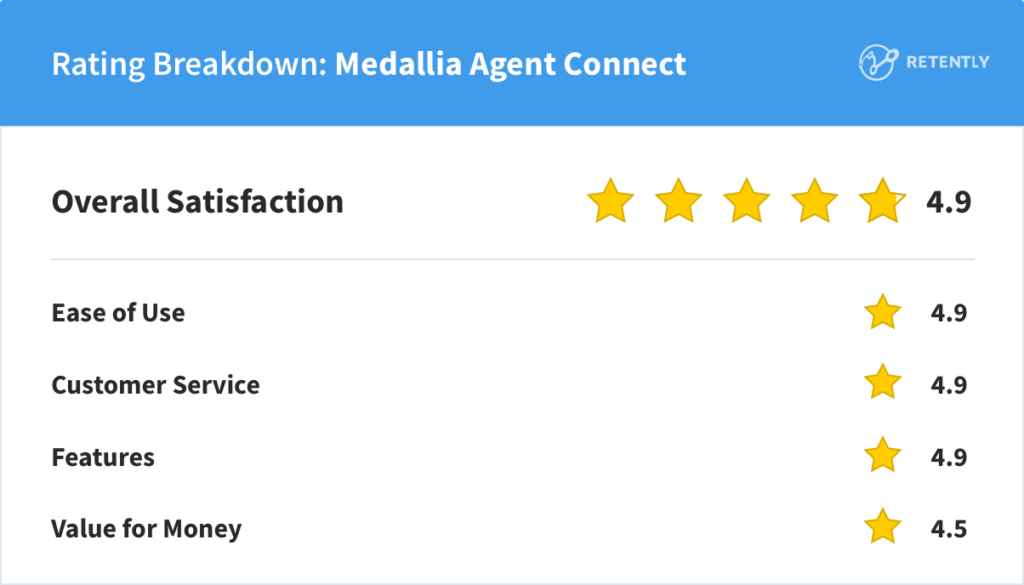
3. Simplesat
Description: Simplesat is particularly favored by small to medium-sized businesses, especially in the IT and service sectors, for its straightforward setup and functionality. However, it lacks advanced QA features, making it less suited for more complex customer support environments.
Features: The platform integrates well with tools like Zendesk and Slack, allowing businesses to embed surveys directly into emails or service platforms. It also provides basic customization options, such as branding survey landing pages and choosing from different types of feedback icons. Additionally, the tool allows businesses to automatically publish positive feedback on their website. While the platform’s reporting and analytics tools are functional, some users desire more advanced features and greater customization options.
User Reviews: On the positive side, users praise the platform for its simplicity, which makes it easy to use for both businesses and their customers. The integration capabilities are also appreciated, particularly for streamlining the feedback collection process. Furthermore, Simplesat’s customer support team receives good marks for being helpful, especially during the setup process.
However, some users have noted a few downsides. The platform’s customization options are somewhat limited, particularly in terms of dashboard configuration and survey presentation. The reporting and analytics features, while functional, are sometimes viewed as too basic for more comprehensive analysis. A few users also mention challenges during the initial setup, especially when trying to filter out certain types of tickets from survey distribution. Additionally, the platform does not allow customers to update their responses if they make a mistake, which can be frustrating.
Pricing: It offers a straightforward pricing structure with multiple tiers:
- Standard Plan: $119 per month. This plan includes 5 account users, 1,000 monthly responses, unlimited surveys and unlimited support agents.
- Pro Plan: $249 per month. It includes 15 account users, 3,000 monthly responses, multi-brand support, and custom CSS.
- Elite Plan: $499 per month. This plan offers 30 account users, 7,000 monthly responses, enterprise SSO, and custom email templates.
- Enterprise Plan: You need to contact the company for custom pricing.
Rating Breakdown: The overall rating is 4.8 out of 5, indicating good satisfaction among users. The platform scores 4.9 out of 5 for Ease of Use, reflecting a user-friendly interface. Customer Service also receives a rating of 4.9 out of 5, with users praising the support team’s effectiveness. The platform’s features earn a rating of 4.5 out of 5, with most users finding them effective, though some express a desire for more customization options and advanced reporting capabilities. In terms of Value for Money, Simplesat scores 4.8 out of 5, with users generally considering it a cost-effective solution that delivers good value, especially for small to medium-sized businesses.
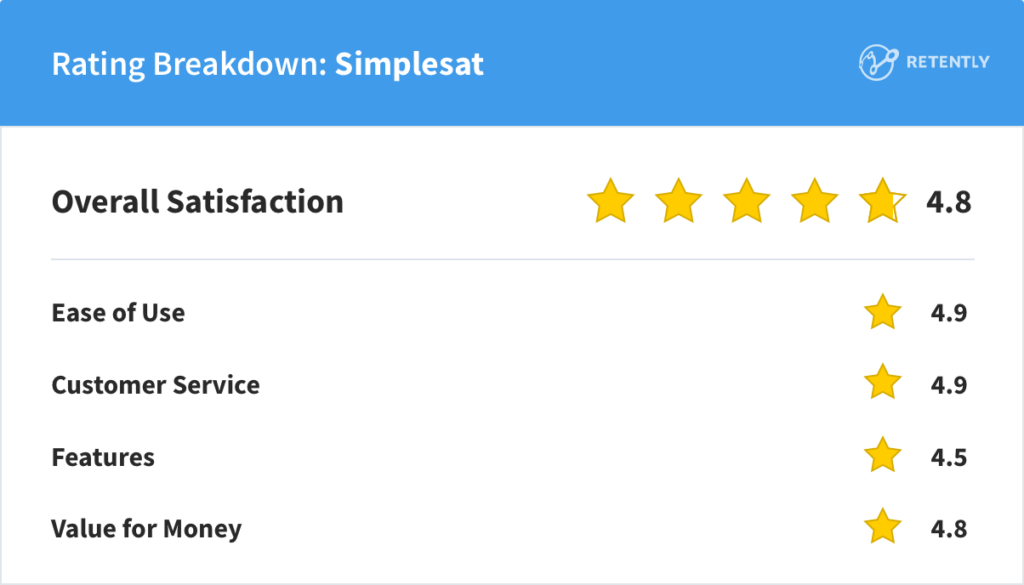
4. AskNicely
Description: AskNicely is suitable for medium-sized businesses focused on frontline experience. The platform’s tiered pricing structure allows for scalability, though the lack of upfront pricing details can be a drawback for companies needing quick decision-making.
Features: The platform supports various metrics, including NPS, CSAT and CES surveys. These can be be sent through several channels such as email and web, with options for survey branching and triggering logic. It offers integrations with tools like Slack, Shopify and Zendesk. This makes it easier to connect feedback data with other business systems. Additionally, the platform includes features like follow-up workflow automation, theme analysis, and simple reporting tools to help brands act on customer insights. Higher-tier plans also offer employee engagement tools, including CX goals, recognition workflows and team feedback mechanisms.
User Reviews: Users generally praise AskNicely for its customer support, ease of use, and effective integration and automation features. However, some users have pointed out that the navigation within the interface can be confusing, especially when moving beyond basic to-do lists or managing people within the system. The reporting features have also been criticized as somewhat limited, with a need for more advanced filters and custom analytics. While integration options are a strength, setting them up can sometimes be less straightforward, leading to confusion about when certain features apply to the entire account versus subsets. Additionally, some users feel that higher-priced plans, which unlock advanced features may not offer a value to match the cost.
Pricing: Specific pricing details are available upon request from the sales team.
Rating Breakdown: AskNicely has received an overall rating of 4.6 out of 5. The platform’s Ease of Use is rated at 4.5 out of 5, reflecting its generally intuitive design, although some users have noted areas for improvement in interface navigation. Customer Service is rated at 4.7 out of 5, with users frequently praising the support team’s responsiveness. The Features of the platform receive a rating of 4.1 out of 5, indicating satisfaction with the core functionalities, though there is room for improvement in advanced reporting and integration options. The Value for Money is rated at 4.3 out of 5, suggesting that most users feel they receive good value from the platform, despite some concerns about the cost of higher-tier features.
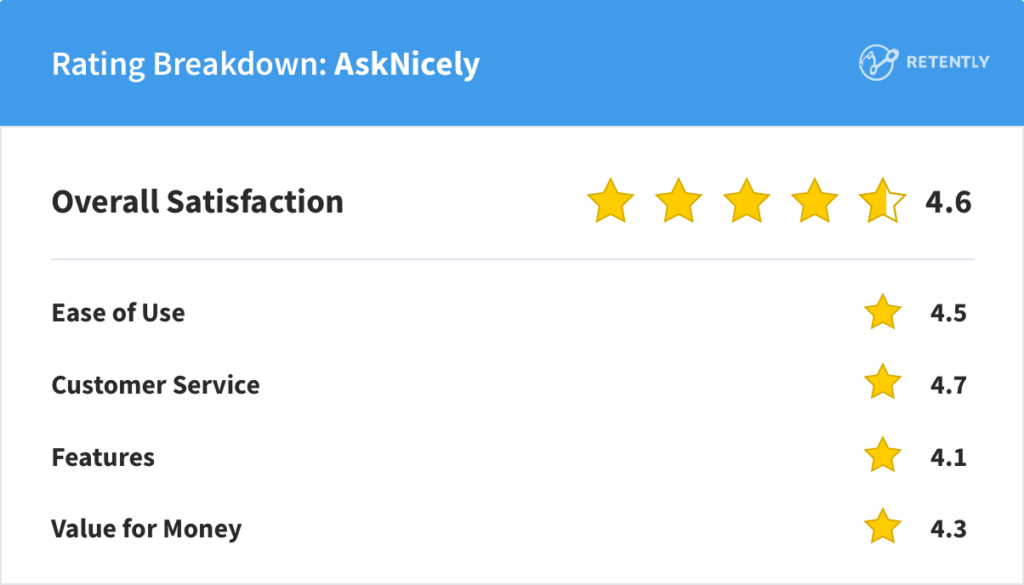
How to Choose the Best CSAT Tool for Your Brand
Selecting the perfect CSAT tool for your ecommerce or retail business isn’t a simple decision. Each business has unique needs, budgets and goals, so it’s important to choose a tool that aligns with where you are now and where you want to be in the future. Here’s how manage the selection process and make the best choice for your business:
1. Assess Your Business Needs
Start by taking a close look at your current setup and growth plans. What are the specific challenges you’re facing with customer satisfaction? Are you struggling with low survey response rates, or do you need more detailed analytics to understand why certain touchpoints are underperforming?
Consider the following:
- Integration Needs: If you’re using Shopify or a marketing automation tool like Klaviyo, you’ll want a CSAT tool that integrates easily with these systems. This will help you collect feedback and take action without disrupting your workflow.
- Customizability: Do you need the ability to tailor surveys to different touchpoints, or are pre-built templates sufficient?
- Automation: How important is it for you to automate follow-ups or trigger specific workflows based on customer feedback?
- Data Segmentation: Go for a CSAT software that lets you break down data by customer type, behavior, or specific interactions. This helps you spot patterns and make improvements where they’re needed most.
- QA Features: Check if the tool offers quality assurance options like assigning responses to certain agents, adding notes, or tracking how issues are handled. These features help keep your customer service top-notch.
- Reporting & Analytics: Do you need basic reporting to keep tabs on satisfaction, or are you looking for in-depth analytics to drive strategic decisions?
By understanding your specific needs, you can narrow down the list of potential tools to those that offer the features most relevant to your business.
2. Budget Considerations
Next, think about your budget. CSAT tools come in a range of pricing models, from basic, affordable options to more premium solutions. While it might be tempting to go for the tool with the most features, consider what you actually need and what you can afford.
- Subscription Costs: Consider whether the tool offers a pricing model that fits your budget – monthly or annual subscriptions can vary in cost.
- Hidden Fees: Be aware of any additional costs, such as charges for extra users, advanced features, or premium support.
- Value for Money: Evaluate the value the tool offers relative to its cost. A higher-priced tool might be worth the investment if it provides features that will save you time or improve customer satisfaction significantly. However, the most expensive option isn’t always the best one for your business. Focus on finding a tool that offers the right balance of features and affordability.
3. Trial Periods & Demos
Before committing to a CSAT tool, try it out. Many providers offer free trials or demos, allowing you to see how the tool works in practice.
- Ease of Use: During the trial period, pay attention to how easy the tool is to set up and use. Does it integrate smoothly with your existing systems? Is the user interface intuitive?
- Feature Testing: Test the key features you’re most interested in. For instance, if managing high-volume sales is a must, check how efficiently the tool handles bulk feedback collection and analysis during peak shopping periods.
- Support Quality: Use this time to evaluate the quality of customer support. Are they responsive and helpful if you run into issues? This can be a significant factor in your decision-making process.
A trial or demo is your opportunity to make sure the tool is a good fit for your team and your business processes, so take full advantage of it.
Wrapping Up
Choosing the right CSAT solution is not a technical but a strategic decision that can greatly impact your ecommerce or retail business. It will not only help you gather invaluable customer feedback but also act on it effectively, turning insights into tangible improvements.
Whether you’re aiming to streamline your feedback collection, gain deeper insights into customer behavior, or simply make your customers feel more valued, Retently can help you achieve your goals. Take the time to use it to its full potential, and you’ll be well on your way to creating a customer experience that exceeds expectations.
We’d love to hear from you! Have you used any of the CSAT tools mentioned? What challenges have you faced in improving customer satisfaction, and how have you overcome them? Share your experiences in the comments below – we’re always eager to learn from our readers.


































 Christina Sol
Christina Sol 



 Greg Raileanu
Greg Raileanu 
